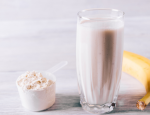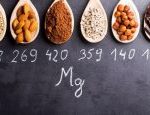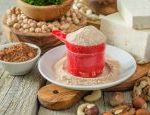When choosing a protein supplement, we can choose between those of animal origin or of vegetable origin depending on our tastes, preferences or values.
Inside Of those of animal origin, the most used is the protein obtained from whey. Despite this, there are other sources, for example, beef.
Before making a small comparison between both sources, we are going to analyze each of them to obtain a global vision of both.
Vegetable or vegan protein supplements
Vegetable protein supplements are those that have been made from one or various vegetable sources of protein, such as legumes, seeds or cereals.
The ingredients commonly used as main raw materials are: soybeans, hemp, peas, rice, chia or amaranth. To obtain exclusively the protein, these foods are usually pressed to separate the oils from a remaining mass in which the proteins will be contained. This is crushed and the powder that you use as a supplement or protein supplement is obtained.
Vegan protein supplements can be made with a single protein source or combine several of them. The combination of several sources is usually done because the main drawback of a vegetable protein is that it is not of high biological value.
Proteins vegan
This means that s is usually lacking between 1 and several amino acids.
One of the most common combinations in a supplement based on a mixture, it is the use of peas, hemp and rice. Rice does not contain the amino acid lysine, peas have a lack of methionine and when combined, both are compensated.
Unlike hemp protein, if it contains all the essential amino acids.
As a pure protein supplement, we can find any of the sources mentioned above by themselves. A difference outside the aminogram is the taste. Pea protein tends to have a more bitter taste on its own, rice neutral, and soy protein a somewhat softer texture. Despite this, the growth of the market has made this type of protein evolve and be improved with different sweeteners that provide different flavors to facilitate its consumption.

whey-based protein
Whey protein supplements are obtained from cow’s whey. It is the most widely used type of protein powder throughout the world due to the great variety and availability of formats, flavors, accessibility and purity processes from which to choose.
It is obtained from the co stirring of the milk. This is separated into two parts, the casein and the whey, which is dehydrated to obtain the protein powder. In it we find up to 20% of the total milk proteins.
It stands out that it is a source of high biological value. That is, it contains all the essential amino acids and is not lacking in any, as is the case with that of plant origin.
Within the protein obtained from whey, we can differentiate between 3 types depending on of the processing or purity that we want:
- Concentrated of whey: it is the most economical form of whey protein. It has a higher content of fat and carbohydrate, including lactose.
- Isolated protein: it is taken to a higher level of processing in which fats and carbohydrates are eliminated. Its lactose content is practically non-existent. It is a higher level of purity.
- Hydrolyzed : It is the most expensive form due to the purity and quality. It has been partially hydrolyzed in such a way that its formula facilitates the digestion and absorption of amino acids.

Which one to choose? Differences?
Amino acids
Whey protein is richer in branched amino acids (BCAAs), it dissolves with easier and has a more pleasant texture than the vegetable protein supplement.
It is recommended to choose a vegetable protein supplement that combines various sources, since as we have mentioned in the first section, it is usually lacking one or several amino acids, and they complement each other.
Lactose and assimilation
If you are lactose intolerant, a vegan protein can be suitable for you. Within those of whey, as long as a concentrate is not chosen, it will be equally valid.
In case of allergy, it is recommended to choose another source of animal origin such as egg or beef, and a serious vegetable ideal too.
Values or ideologies
In case of being vegan, or not consuming products of animal origin, it is recommended to choose one vegan or vegetable protein as it will not contain products or components against ideologies.
Is milk protein good for the body?
Milk protein contains a minimum of 90% protein. It contains very little fat (typically less than 3%), carbohydrates or lactose and can be used as a daily supplement for those who do not consume the recommended amount of protein in their diet or those who are lactose intolerant.
How much protein should I eat per day?
The daily average is 0.8 grams of protein per kilogram of body weight , or 0.36 grams per pound. This equates to: 56 grams per day for the average sedentary man. 46 grams per day for the average sedentary woman.
What are the benefits of vegetable protein?
100% raw vegan protein has several benefits, including pain reduction . A vegan diet can help fight inflammation and pain. Plant proteins are also more ethical and sustainable.
Can you build muscle with vegan protein?
According to a new study, the answer is yes. Researchers found that vegan protein is as beneficial for muscle mass and strength as animal protein . Protein helps repair and build muscle, so it’s smart to recover after a hard workout with a shake, energy snack, or other high-protein snack.


